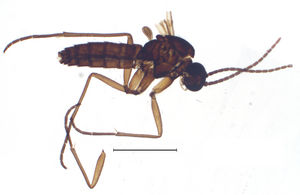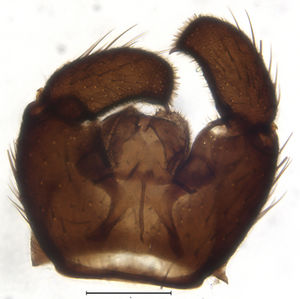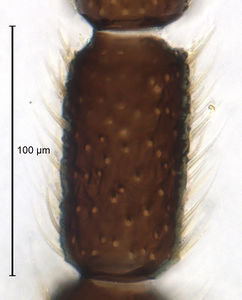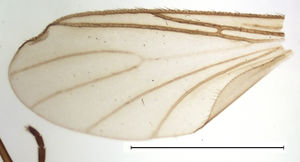Trichosiopsis seminuda
Ordo: Diptera
Familia: Sciaridae
Genus: Trichosiopsis
Name
Trichosiopsis seminuda unpublished
Type material
Holotype: ♂, 10.05.2015, yellow pan trap, leg. Olberg, bf-sci-01120 in NHMO
Type locality
Norway, Buskerud, Modum
Barcoded material
| Stadium | Country | Province | Locality | Habitat | Method | Date | Collector | Collection Number | Collection | Latitude | Longitude | Elevation (m) |
|---|---|---|---|---|---|---|---|---|---|---|---|---|
| 1 ♂ (holotype) | Norway | Buskerud | Modum, Djupgrop I sandtaket | yellow pan trap | 10.05.2015 | Stefan Olberg | bf-sci-01120 | NHMO | 59.965 | 9.903 | 195 | |
| 1 ♂ | Norway | Hedmark | Eidskog, Ekeberget | Malaise Trap | 15.06.2014 | Stefan Olberg | bf-sci-00297 | NHMO | 60.01 | 12.124 | 190 |
Description (male)
Head. Eye bridge 3 rows of facets. Antenna unicolour. LW-index of 4th flagellomere 1.6–1.85; neck 0.17–0.27 × segment width; transition of basal part to neck pronounced. Colour of neck unicolour. Antennal setae shorter than segment width; fine; dense; adjacent. Palpus darkened; of normal length; palpomeres 3. First palpomere of normal shape; with 2–3 setae; with only sparse sensilla. Second palpomere short and oval. Third palpomere as long as first. Thorax. Colour bright brown. Notum unicolour. Thoracic setae normal; brown. Posterior pronotum setose. Postpronotal setae 1–3; fine. Mesothoracic sclerites bare. Legs. Colour yellow-brown. Hind coxa of same colour as femora. Setae on front coxa pale. Front tibial organ as patch of setae; dark; front tibial organ not bordered. Tibial setae on hind legs weak and inconspicuous. Tibial spurs of equal length. Claws untoothed. Wing. Wing slightly darkened; with weakly developed anal lobe. Wing membrane without macrotrichia. Wing venation weak, with faint stM. M-fork of normal shape. R1 ending at or slightly before base of m-fork; posterior veins with macrotrichia; stM bare; CuA1 and CuA2 with a few macrotrichia; bM bare; r-m with few setae; bM:r-M 0.9–1.2; st-Cu:bM 0.2–0.4; R1:R 0.8–1.1; c:w 0.55–0.65. Halter darkened; of normal length. Abdomen. Abdominal setae strong; sparse; on tergites brown; on sternites brown. Hypopygium concolour with abdomen; LW-index 0.56–0.67. Base of gonocoxites with weak setae; gonocoxites broadly separated; inner margin of gonocoxites typically U-shaped; inner membrane of hypopygium scarcely setose; ventral margin of gonocoxite with short setae. Gonostylus elongate; LW-index 2.1–2.33; Inner margin concave; apex equally rounded. Apical tooth present; without internal structure; of medium strength; LW-Index 1.5–2. Awl-like setae normal; beneath apical tooth absent, or present beneath apical tooth. Megasetae absent. Whiplash-hair absent. Tegmen 0.61–0.71 × longer than broad; equally rounded, or rectangular with rounded edges; without special features; central process absent. Length of ejaculatory apodeme/hypopygium 32–38 %; base of ejaculatory apodeme present. Field with aedeagal teeth inconspicuous. Measurements. Body size 2.2–2.8 mm. Hind tibia 0.75–0.9 mm. Wing length 1.8–2.4 mm.
Diagnosis
Trichosiopsis seminuda is a small species and shows some tendency of wing reduction like Trichosiopsis viaticella, Trichosiopsis reducta and Trichosiopsis subopaca. By the shape of the gonostylus it resembles most Tr. viaticella, but has still more setose cu-veins, not darkened coxae and a distinct base of aedeagal apodeme.
DNA Barcoding
The COI sequence is assigned to BIN BOLD:ADA0838 (average distance 0.31%, max. 0.31%, n=2, K2P: 15.89%).
Etymology
lat. semi = half; nudus = naked, bare. The name refers to partial lacking of setae on the posterior wing veins.
Discussion
Like many small-sized species with reduced characters, Tr. seminuda is genetically very isolated from the rest of the species. A K2P for more than 15% may indicate, that it belongs to a distinct phylogenetic line, possibly together with Tr. viaticella, which is not yet barcoded.
Distribution
Norway.
Images
|





